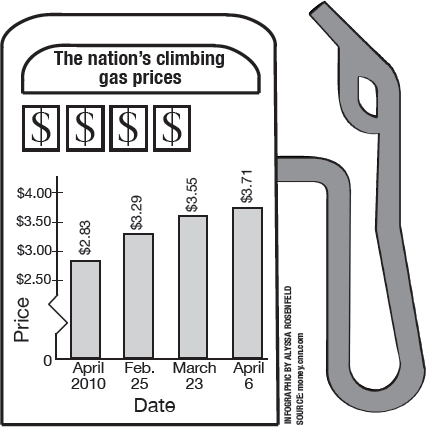The political unrest in the Middle East has not only impacted the people living there, but it has contributed to the recent surge in gas prices all over the world.
Beginning in January with the revolution in Egypt, gas prices began to slowly climb up from two dollars to three. But students just assumed that once the country stabilized, the prices, too, would stabilize.
“At first it didn’t really affect me. It was just a couple more dollars that I had to pay for gas. Now, instead of paying $50 for gas, I’m paying $75,” senior Oscar Valido said. “We’re in a bad time with the economy right now, so it’s not helping the situation.”
It wasn’t until prices reached almost four dollars though, that many Americans were forced to adjust some of their habits. Car rides were often cut short, people didn’t visit super markets as frequently, and long trips to work became a wallet-draining activity.
Unfortunately, according to Shell Gas Station manager Nermin Nabil, this is not just a phase.
“Whenever an issue happens in the world, it affects gas prices. The incident in Japan raised prices, and the protests in Tunisia, Egypt, Libya, Yemen, and Bahrain have been raising them for a while,” Nabil said. “This happens because when the oil markets aren’t sure of what is going to happen, the people bidding on oil bid higher, therefore raising the price of the barrel.”
As of now, the majority of gas stations in the Miami area are selling regular gas at around $3.60 per gallon, premium at around $3.80 and super at around $3.90.
“I notice how angry people are when they walk into the station. They used to buy super and premium, but now everyone mostly buys regular, and they always leave frustrated,” Nabil said.
As the numbers outside stations get higher, the pessimism of drivers increases. But higher gas prices mean that some Americans are going to have to start adopting techniques to overcome this obstacle.
“Me and my mom discovered a simple way to save gas,” freshmen Hannah Kealy said. “At places like Publix you can buy $50 gift cards for gas, but you only have to pay $40 for them. That’s ten dollars saved on gas, and in this situation that makes a huge difference.”
Although it may appear as if a wave of bad luck has hit America, students find comfort in the fact that the newfound conscientiousness of gas usage can be directed toward protecting the environment through techniques like carpooling and using public transportation.
“I drive a Smart Car because it doesn’t use gas,” sophomore Madi Dahlem said. “I’ve also started to drive my friends around and have my boyfriend take me places. Talk about ‘going green.’”
Opening a window and letting the natural Miami breeze fill a car rather than the gas-draining air conditioner is a simple yet efficient way to save gas. Driving slower, using a GPS to plot the shortest route, and waiting to fill up the tank until it’s almost empty are easy ways to save on gas.



